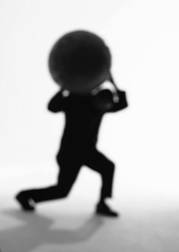Brian was a friend of mine whom I had known quite well about 10 years ago. He was very  independent and self reliant, but he was the kind of person you could always rely upon for help if. Or if you simply wanted to talk through a problem he was a good listener and often had good advice.
independent and self reliant, but he was the kind of person you could always rely upon for help if. Or if you simply wanted to talk through a problem he was a good listener and often had good advice.
One of the reasons he often had good advice was that when he considered any problem, issue, idea or potential plan, he was very good at seeing the possible flaws or things that could go wrong. He was equally good at creating contingency strategies for avoiding the things that could go wrong.
This had led him into a career as a consultant in the area of developing corporate strategies for private sector companies and government agencies. He was a very good consultant and, though he had started by working for a very large consultancy firm, by the time I met him he had his own firm. He said that he felt more secure with his own firm because he was his own independent boss. Security in all things was a central tenant for Brian.
The difficulty was that the personal qualities that made him so good in his career were damaging his personal and family life. He was deeply devoted to his family and was always there if they needed help or advice. But he found it very difficult to directly express his feelings of love for them – or even to talk about his private thoughts or feelings. His ability to see or anticipate what was wrong or could go wrong caused him to be overly critical, which hurt his wife and children, and which was not his intention – he just wanted to help. But he could not himself ask for help from anyone.
At a certain point, this quite nearly broke up his marriage. But the turning point for Brian came when he made a trip to see his parents who lived in another country – and whom he had not seen in about ten years. Because of the crisis in his marriage he was able to see his parents – and the way they had affected him – in an entirely new way. Brian’s father was a weak and irresponsible man. Since he was the sole breadwinner and often without a job when Brian was growing up, Brian remembered the extreme insecurity he and the family had felt when he was a child. Brian suddenly understood with absolute clarity that his very great need to be strong, independent and self reliant grew out of the extreme insecurity he and his family experienced from his father’s weakness and irresponsibility.
Brian could now see that when he was helping others, listening to them, giving advice, he felt strong and secure. But if he asked for help from anyone or expressed emotions to his family, he would feel vulnerable and exposed, resulting in strong feelings of insecurity. Thus, to avoid these feelings he had become independent and self reliant to a fault, and it was destroying his marriage.
Brian returned from the trip with a strong commitment to change and moderate his extreme independent and self reliant behaviour. He actually came to me for coaching to assist him with this. Because of his strong commitment to change, within several months he had brought balance back into his life.
We generally admire the qualities of independence and self reliance in people. But Brian’s experience demonstrates one of those paradoxical life truths: no matter how admirable a characteristic might be, taken to extremes and without balance, it becomes a liability.
Do you or your friends know someone like Brian? How has it affected his or her relationships?
Share your thoughts
You must be logged in to post a comment.